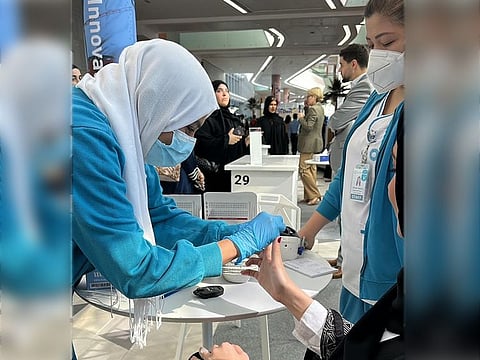After PureHealth and Saudi Avalon Pharma IPOs, will more GCC healthcare businesses take same route?
December saw PureHealth's mega IPO; now, Saudi Avalon Pharma gets its share of investors

Dubai: UAE’s healthcare holding company PureHealth has just signed off on Dh16.3 billion in 2023 revenues. It’s first results after a stellar IPO – whose retail trance was oversubscribed 483 times - in December last.
In Saudi Arabia, Avalon Pharma, which is into producing generic medicines, met with a solid response for its own IPO, with a subscription coverage of 54.27 times and demand hitting SR2.67 billion. (The IPO had set the cap at SR1.64 billion.)
And there could be other healthcare businesses from the Gulf that could be tempted into stock market floats of their own. “GCC’s healthcare sector is having a moment, and the PureHealth IPO more than anything showed the appetite from retail and institutional investors for a stake in the wider sector growth,” said a Kuwait based market analyst.
Looking at the Avalon Pharma float, institutional book-building recorded orders of SR68.27 billion, with a coverage of 138.76 times.
Avalon pricing
Avalon Pharma's final offer price was set at SR82 per share, implying a market cap of SR1.64 billion (USD 437.33 million) on listing.
“Many healthcare companies in the Gulf are looking for opportunities to expand their market share, improve operational efficiency, and enhance profitability,” said Vijay Valecha, Chief Investment officer at century Financial. “The ongoing IPO momentum in the GCC regions – especially in Saudi and UAE - is expected to act as a tailwind for healthcare stocks and new listings too.
“Retail and institutional investors have been looking for ways to diversify investments, given the ongoing geopolitical crisis. This is evident from most IPO performances in the region.”
Windows of healthcare opportunity
Along with its 2023 financials, PureHealth also provided a likely state of affairs for the region’s healthcare sector.
“Throughout the Middle East - and specifically in the UAE - a confluence of demographic shifts, tech advancements and a growing focus on quality healthcare services is poised to revolutionize the region’s healthcare landscape,” the PureHealth market outlook states. (On ADX, the stock is trading at Dh4.8. It’s peak point remains Dh6.05. The IPO price was Dh3.26.)
“The healthcare market in the MENA region is projected to grow at a CAGR of 11.7 per cent, surging from $185.5 billion in 2019 to $243.6 billion in 2023. In 2022, the healthcare expenditure in the GCC was estimated at $105 billion, with the UAE alone accounting for 25 per cent of the total healthcare spending in the GCC.”
Middle East healthcare sector is undergoing rapid transformation - there's the growth in population, there is an aging demographic, and there's the increased demand for quality and affordable healthcare

Aster stake sale adds to healthcare deal visibility
It explains the steady flow of high-profile deals in the healthcare space, whether it’s Fajr Capital acquiring a majority stake in UAE-based Aster DM Healthcare, or where Dubai-based investment firm GII keeps adding to its healthcare assets in Saudi Arabia.
“The post-Covid scenario has completely changed mindsets on equity investments,” said the Kuwait-based analyst. “The biggest Gulf businesses today want equity in established healthcare operators. And this support is what will help create new hospitals and specialisation in treating the growing populations of the Gulf.
“Deals like the one for Aster will keep happening in other GCC markets with higher frequency.”
And the speculation keeps building as to which would be the next big deal in the Gulf's healthcare space. Or for that matter, who's up next for a healthcare IPO...
TruDoc's makes a deal, plans entry into new markets
Within the healthcare services space too, there are deals happening. TruDoc Healthcare, the Gulf virtual primary care provider, has bought Wellthy Therapeutics, one of Asia’s leading chronic disease management platform. This also sets up TruDoc's for an expansion into new markets including India. "We are crafting an integrated care experience that’s tailored to the changing needs of our patients and our clients," said Vish Narain, Chairman of TruDoc. "We envision a future where primary care is easily accessible, starting with digital platforms, followed by in-home care, with in-clinic visits only when needed."
Sign up for the Daily Briefing
Get the latest news and updates straight to your inbox



